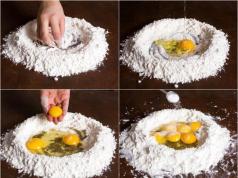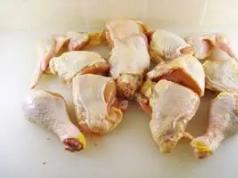1. Work on exercise 529.
2. The words are written on the board:
Shine, shine.... (sparkle, sparkle, glow).
Play pranks, play pranks, ... (play around, play pranks).
Win, overcome, ... (overcome, break, smash).
- Continue each line, choosing synonyms.
Children perform this work collectively under the guidance of a teacher.
3. Compiling sentences with synonymous verbs. (Ex. 531.)
VI. Choice of antonyms.
1. Work on exercise 535.
2. The words are written on the board:
laugh - ... (cry) speak - ... (be silent)
turn pale - ... (blush) love - ... (hate)
warm - ... (cool) defend - ... (attack)
go to bed - ... (get up) save - ... (destroy)
- Choose antonyms. Underline the spellings.
3. Reading the rule, p. 73.
VII. Summary of the lesson.
- What did you learn in class today?
What are the names of words that are close and opposite in meaning?
Homework. Exercise 536.
Lesson 145
VERBS IN DIFFERENT MEANINGS
Target: to introduce students to the use of the same verb in different meanings, when the meaning of the word is specified in the sentence.
During the classes
I. Organizational moment.
Which words can be spell-checked?
What is the synonym for the word found himself did you pick?
III. A minute of calligraphy.
The words are written on the board: p..lto, s..pogi, k..rtina, k..r..ndash.
- Read the words. How are they similar? ( These are inanimate nouns, answer the question what? Spelling missing in all words - unchecked unstressed vowel but, means vocabulary words.)
What word is missing here? Why? ( 1) Extra word - coat, it is two-sided. The rest of the words are trisyllabic. 2) Extra word - pencil, in it you need to remember the spelling of two spellings. 3) Extra word - boots, it is plural. The rest are singular nouns..)
- Today we will make a chain of letters from the spellings of these words. What letters will be included in the chain? ( In all words, the spelling is a letter but, in the word coat – b, in the word boots – about, in the word pencil w – w. So, we will write a chain of four letters: a, b, o, sh .)
aosh aosh aosh aosh ...
- Determine the order of writing the letters in the chains and continue the line to the end. ( In all chains, only the soft sign changes its location.)
IV. An exercise in using the same verbs in different meanings.
1. Work on exercise 538.
Reading language information, p. 75.
2. A poem is written on the board:
Who grinds what?
Millers grind grain with millstones,
We grind peppercorns ourselves.
But we don't understand one thing.
What is this talker grinding with his tongue?
- So who is grinding? Explain.
- How do you understand the expression "grind with your tongue"? Choose verbs that are close in meaning to it. ( to talk in vain - to talk idle, to speak empty words.)
3. Work on exercise 539.
4. Write on the board:
(Bonfires, cheeks) are burning. (Child, river) is sleeping. (Frost, grasshoppers) crack. (Milk, life) boils. (Spring, student) in a hurry. (Joy, chorus) sings. (Face, flame) burning.
- For this verb, choose a noun so that the verb is used in a figurative sense.
Explain what the resulting expressions mean.
5. Independent work. (Ex. 540.)
V. Summary of the lesson.
- What did you learn in class today?
- Where can you clarify the meaning of the same word?
Homework. Exercise 541.
Lesson 146
Goals: to acquaint students with the features of the reasoning text; develop the ability to use verbs in the text.
During the classes
I. Organizational moment.
II. Checking homework.
Why do we use words in a figurative sense in a sentence? Give examples.
III. A minute of calligraphy.
The riddle is written on the board:
White boots..ki,
Green grays..ki.
- Read the riddle. What it is? ( Birch.)
What words helped you solve the riddle?
- Who guessed what letter we will write at the minute of calligraphy? ( We will write a letter well is the missing spelling of the data in the word puzzle : sapo well ki - sapo well ok, gray well ki - gray well echki .)
- letter well we will write in a chain along with the letters that are the endings of the given nouns. What are these letters? ( In a noun boots ending, in noun earrings ending too.)
Live Live …
- Determine the order of writing the letters in the chains and continue the line to the end.
3. Cultivate love for the native language.
During the classes.
I.Organizing time.
- Good morning everyone morning!
1 slide: Hello school!
Hello class!
You meet us again!
Repeat these words.
See how the sun rejoices in response to you. I think we will start our lesson with a good mood.
Sit quietly.
II. Introduction to the topic.
2 slide:
Read the words:
get through
penetrate
destroy
Why are all these words in one group? ( are verbs)
Prove it. ( children tell the rule + example)
Read only the first three words. What can be said about them?
(These are verbs that are close in meaning.
What is their meaning? ( get inside something).
How else can they be called? ( synonyms)
That's right, words are friends.
Read the rest of the words. What can be said about them?
(These are verbs that are opposite in meaning.)
How to understand "opposite"? (vice versa)
That's right, these are words - arguing.
How else can they be called? (antonyms).
Who will name the topic of today's lesson?
3 slide:- Read again the name of our lesson topic:
Verbs are synonyms, verbs are antonyms.
Why do we need them? ( To make our speech richer, more beautiful and more accurate).
And this is what we will see today. And the purpose of our lesson:
Learn to use verbs that are close and opposite in meaning in speech.
Sh. Work in notebooks.
4 slide:
Open your notebooks, write down the number: April twenty third. Classwork.
A minute of calligraphy. On the board, carefully read the words for a minute of calligraphy: (One child reads)
quarrel to be– dra to be
(I show on the board).
Pay attention to the correct spelling of the part of the word: to be and the correct combination of letters Xia (bottom connection).
IV. Working on new material.
What is special about this pair of words? ( These verbs are synonyms.
How did you guess? ( Words that are opposite in meaning, vice versa).
Who can say what are synonyms? (guys speak out)
In order for you to remember better, I have prepared for you
5 slide: "Knots for memory."
6 slide:- Read Lena.
What can we add specifically to verbs - synonyms?
Read again and remember.
Tell each other the rule, giving your examples, use the examples of verbs - synonyms that you will find on the board.
work move cry
laugh look work
stop laughing be lazy
watch raise
go stand
Examination:
What are synonyms? + example
What are antonyms? ( listening to children)
If I tell you: "sit down", you? (get up), look at the blackboard? (We won't watch). These are verbs - antonyms.
7 slide: Read Julia, the rule.
Knot (entered - vice versa? - left), (flew up - vice versa? - flew off).
Tell each other the rule, give examples, use the words on the board.
What are antonyms?
Well done, well oriented, so they remembered.
Let's get some rest.
8 slide: Fizminutka. (two frogs in the swamp).
9 slide:
I offer you the “Auction of words”.
What is an "auction"?
- Auction - is a public auction in which a product or property is sold to the highest bidder.
In our case, instead of a product, verbs are given:
scold scold - praise
hurry run - stand
construct build - break
intercede protect - offend
it gets evening darkens - dawns
have fun rejoice - grieve
take take - give
Your task is to find a synonym and antonym for each verb in 5 minutes. Whoever writes the most words gets the highest score.
Let's sum up.
10 slide: - Who is bigger? (Guys who wrote more words come out).
Let's check how it could be written. (Alternately, the children read the words)
Who learned new meanings of words, replenished their vocabulary?
Well done.
Get ready to write down a proverb under dictation.
-Work makes you young, and laziness makes you old.
Explain spelling.
11 slide:
Check the correct spelling.
Name only the verbs.
What can you say about them? (verbs are antonyms).
Prove it.
(open check)
What are synonyms? + examples
What are antonyms? + examples
Who has gone up a notch in their knowledge?
Well done, I'm happy for you. So it will be easier for you to work now,
because:
12 slide: One stone will not lift, but in peace we will move a mountain.
How do you understand the meaning of the proverb?
Name the verb in the first line. Pick an antonym. (raise).
What knot do you remember? (one-root word, opposite in meaning).
Name the second line of the verb. Choose a synonym. (let's move).
Goodies!
Group work:
Gather in groups: Pattern, bouquet and orchard.
Each team receives a task, and you have the right to a "helping hand", i.e. a hint. In case of difficulty, raise your hand - get a hint.
Assignment to the group "Bouquet".
1. Pick up antonyms for the words: disappeared - (?) (found, appeared)
broke - (?) (made, adjusted)
2. Underline the verbs - synonyms.
Looks like a goose at the glow. Looks like a cat on fat.
Assignment to the "Pattern" group.
Replace verbs with synonyms:
The sun has set - (set, set)
The plane landed - (landed)
The boy is running - (rushing, rushing)
The river runs - (flows, flows)
Why is the same verb used differently?
(More precisely, the thought is expressed).
Assignment to the group "Orchard".
1.- What are these words? Prove it.
Built, constructed, erected?
What kind of things can you say that about?
2 How can you avoid repeating words in a sentence?
(Trolleybuses pass along our street, buses pass, cars pass.)
EXAMINATION!
What helped you complete all the tasks?
(knowledge of the rules)
What are the rules? (What are synonyms, what are antonyms?) + examples.
Why do we need them?
Listen carefully to the poem (Misha reads), find synonyms for verbs and an antonym for them.
Who was interested in the lesson?
MM. Zoshchenko appears before us as a magnificent master of a humorous story. Konstantin Fedin wrote about what struck him in the work of M.M. Zoshchenko is a combination of irony and truth of feelings. K. Chukovsky said remarkably about the language of M. Zoshchenko in his essay “Contemporaries”:
“About Zoshchenko’s language, Gorky in one of his letters expresses himself as follows:“ the colorful beads of your vocabulary. ”This“ colorful beads "by the end of the 20s (it was at that time that Zoshchenko became one of the most popular writers) attracted the closest attention of critics .
The famous linguist V.V. Vinogradov considered it necessary to write a whole treatise about him, which he titled: "The Language of Zoshchenko"":
“... This is not an affectionate mosaic of old, rare, curious and pretentious words - this is a lively, fresh, genuine speech that sounded then in bazaars, in trams, in lines, at train stations, in baths.
Zoshchenko was the first of the writers of his generation to introduce into literature on such a large scale this new, not yet fully formed, but victoriously spread throughout the country, non-literary speech and began to freely use it as his own speech. Here he is a pioneer, an innovator.<...>
Many comic and pictorial effects can be drawn from it endlessly, precisely because it is so absurd and ridiculous.
On each page, the writer is ready to note the dislocations of his syntax, the tumors of his vocabulary, demonstrating with cheerful gloating the complete inability of the stratum of people he hates to use reasonable human speech.
Society people. From the NEP series. Artist V.V. Lebedev. 1927
For example, they say about some woman that she "smelled flowers and nasturtiums." As if nasturtiums were not flowers. And here is another similar phrase: "Screams, exclamations and ladies' tears are heard." As if tears could be shed.
Or: “He has a newspaper in one hand. In another postcard. In the third hand, his wife holds a coupon.
"Music played mourning waltzes." "The heart is not like that, but beats rhythmically, as we would like."
"They bring self-criticism to everything."
"What are you doing to disturb the mess!"
“And this is what happens.”
Reading Zoshchenko, it is impossible not to come to the conclusion that the base, rough language of his "tales" was created by a base, rude environment. Those who speak this language in his books are people of very low morality.
skaz- a kind of literary and artistic narrative, built as a story of a person whose position and speech manner are different from the point of view and style of the author himself. The speech of the narrator in the tale goes beyond the limits of the written and literary norm.
- Remember which work of the 19th century that you studied earlier was written in the manner of a tale.
- According to the dictionary of foreign words, determine the meaning of the words: plenary, quorum, permanent, discussion, presidium, industry, speaker, subsection. Make a proposal with each of them.
MM. Zoshchenko knew how and loved to listen to the live speech of various strata of society. He "overheard" peculiar expressions at meetings, drew attention to stylistic features. The writer emphasized: "I write in the language that the street now speaks and thinks."
- Find in the text, firstly, misspelled words (such as “otted”, “coming out”), and secondly, words and phraseological units of a colloquial style (such as “probably”, “sups”, “flapped your ears”). Explain their role in creating a strong characterization of the characters. Pay attention to the fact that these words are used next to foreign words but in origin, and this creates a comic effect.
- Do the characters in the story understand the meaning of the words “plenary”, “quorum”, “presidium”? Support your statement by citing phrases and sentences with these words from the text.
As can be seen from the remarks of this dialogue, the interlocutors do not understand the meaning of the word "presidium". Judging by the compatibility with the words "man" and "orator", the heroes of the story associate the word "presidium" with a living being, with a male person, and this becomes ridiculous. The colloquial form of the gerund "coming out" (instead of "going out") enhances the comedy of the situation. In the sentence: “Then you won’t end up discussing and shouting ...” - the words “discussion” and “shouting” are used as synonyms. The colloquial word “you won’t turn around” enhances the humorous sound of the phrase.
- What bottoms of clericalism (phrases from the official business style) does the author specifically mix up, using the phrase “essentially the day” twice in the story?
- Is it possible to “enter into a point of view”, “subsections to be brewed minimally”, “to treat meetings permanently”? Justify your answer by replacing the words used in their unusual meaning with others that are appropriate in this context.
- Write down all the verbs synonymous with the verb "to speak" that appear in the text. Note the skill of the writer in the selection of linguistic and contextual synonyms.
- A kind of frame for the story of M.M. Zoshchenko are the first "This Russian language is difficult, dear citizens!" and the last "It is difficult, comrades, to speak Russian!" suggestions. Should these sentences be understood literally or figuratively? Do they have ironic overtones?
- What kind of adjective is used in the name "Monkey tongue"? What technique did the author use in the title?
- Name the phraseological units found in the text and determine their stylistic coloring.
- There is an example of gradation in the story. Find it and determine the expressive role of this figure.
- Find phrases and sentences of the “monkey language” in the text, that is, syntactic constructions that are completely devoid of meaning, for example, “specifically, in fact.”
- What style do the following replicas of the heroes of the story belong to: “Look at you”, “Yes, be calm”, “Yes, well?”, “Honest to God”, “For mercy”, “Perhaps”?
- Prepare for an expressive reading of M. Zoshchenko's story.
Independent work
Find and read any other story by M. Zoshchenko, written in the manner of a tale. Prepare a detailed analysis of the language tools that the author uses in the speech characterization of the characters.








